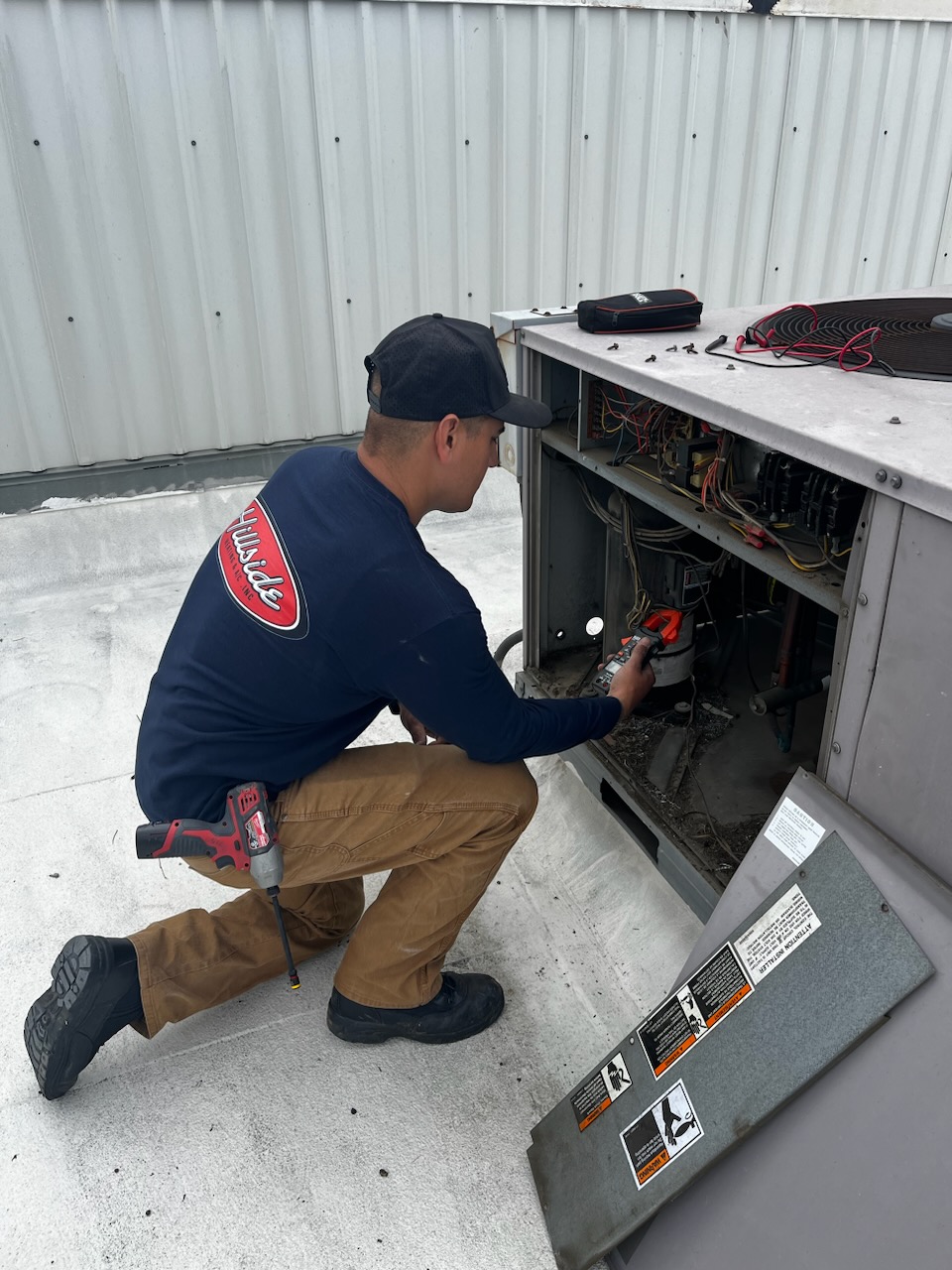REQUEST MORE INFORMATION
Ready to Make a Change? Get Started Today! Book a Campus Tour >
Heating, Ventilation, and Air Conditioning Systems are all around us, providing us with a comfortable atmosphere at home and in the buildings we visit. Although we rarely think about these systems, they make comfortable and healthy living possible. When these systems break down or need to be installed, HVAC Technicians are needed to repair them or install them. If you were to ask any HVAC Technician what their day entails, they would tell you that they spend most of their time installing, repairing, and maintaining HVAC and refrigeration systems to keep us cool during the hot summer days and warm during the cool winter days.
HVAC Technicians work in various residential, commercial, and industrial buildings. Most buildings require HVAC systems, and HVAC technicians are needed to install systems and ensure that systems continue to function properly. So, now that you know the importance of HVAC systems, is pursuing a career as an HVAC technician worth it? We will answer this question below.
Before we dive into the answer, if you’re interested in pursuing a career as an HVAC Technician, consider enrolling in UEI College's HVAC Program (Heating, Ventilation, and Air Conditioning).
Disadvantages of an HVAC Career
Let’s Explore Some of the CONs or disadvantages of Choosing an HVAC Career
Con #1: Long Hours
Some HVAC Technicians have reported working long hours, especially considering that HVAC work is seasonal, meaning work increases during winter and summer when HVAC is necessary when temperatures are very cold or hot. Additionally, HVAC systems in some buildings are quite complex, requiring a significant amount of troubleshooting and repairs. That said, HVAC techs are usually compensated for the hours worked. This is something minor that you should be aware of should you choose a career in the HVAC field.
Con #2: Occupational Hazards
HVAC Technicians may work with hazardous chemicals, deal with heavy equipment, and often work in extreme heat or cold, so it is important to note this should you choose to pursue a career in the HVAC field.
Con #3: Uncomfortable Spaces
HVAC Systems are often located in tight and uncomfortable spaces. So, if you want to pursue a career in the HVAC field, you must be comfortable working in cramped spaces that are often full of dust, fumes, and other hazardous materials. Moreover, you might be working in very cold or very hot environments. If you can tolerate such conditions, you can still choose a career in the HVAC field.
Con #4: Constantly Improving Technology
HVAC systems are continuously evolving, with more energy-efficient systems and thermostats coming to market. So, if you want to work in the HVAC field, you must stay aware of new systems and must understand how they work because you will likely encounter them in the field. If it bothers you to stay aware of the latest HVAC tech, a position in the HVAC field may not be the right career choice for you.
Con #5: Physically Demanding
There is no doubt that a career in the HVAC field is physically demanding, requiring you to have the stamina and strength to stand up for long periods of time, crawl into small spaces, and withstand others forms of physical stress. So, if you have the stamina and ability to put up with these conditions, HVAC may be the right career move for you.
Con #6: Need to Stay Up to Date
If you are looking for a career you can do in your sleep, HVAC is not it. HVAC requires a great deal of critical thinking, and with evolving technology, you’ll always be developing new skills. This is a career for someone who thrives on learning by trial and error.
Con #7: Odd Hours.
Many companies understand how important it can be to have functioning HVAC equipment. As you are gaining experience in this field, especially in an entry-level position, you may have to work on-call and respond to issues outside of normal business hours to troubleshoot and fix HVAC issues.
Con #8: Requires Training
Some companies may promise on-the-job training for HVAC technicians, but in most states, technicians are required to have certification through the EPA to work independently as a technician or installer. You may need to spend some money upfront for your education in order to get into this field. The good news is the training can be completed in less than 10 months and is more affordable than a university degree.
Is HVAC the Right Career For You?
If you’re looking for a good career that allows you to work with your hands, becoming an HVAC technician may be the right move for you. The great thing about becoming an HVAC technician is that you can train and gain the necessary skills and knowledge in less than a year. This allows you to spend little time learning about the HVAC field and more time working and earning money for yourself and your family.
As an HVAC Tech, you will definitely have an active career as most of your duties will involve installing, repairing, and maintaining HVAC and refrigeration systems. You will get to work both indoors and outdoors, and no two days are the same!
If you like interacting with others, you will have the opportunity to talk to customers, supervisors, and dispatch personnel. Interacting with others is necessary to teach customers about the various HVAC systems in order to help them choose the system that’s right for them. Also, you will have to interact with your supervisors to keep them updated on what you’re working on.
That said, as mentioned above in the cons section, should you be comfortable with some of the cons of working as an HVAC Tech, then pursuing a career as an HVAC Tech may be the right move for you.
How To Become an HVAC Technician?
Our How To Become an HVAC Tech Guide will walk you through everything you need to know about how to become an HVAC Tech. To summarize, to become an HVAC Tech, you should complete an HVAC Training Program to gain the basic knowledge and skills needed to install, service, and repair HVAC systems. After you’ve gained the knowledge, you should seek to obtain two important HVAC certifications. Once you’re done with these items, it’s time to search for a position where you can apply your newly learned knowledge and skills. For more details, check out our comprehensive HVAC Guide.
How Long Does It Take To Become an HVAC Technician?
You can train for an entry-level position as an HVAC technician in less than 10 months. With training from UEI College, you will have the opportunity to learn new concepts through lectures and then put those concepts into practice with hands-on projects. You will also have the opportunity to learn from experienced instructors who have spent time working in the HVAC industry.
What Are Some Skills That HVAC Techs Should Have?
HVAC technicians work with people, tools, and technology. Their job changes daily and requires a wide variety of both technical and soft skills. Some technical skills HVAC technicians should have or should learn during a training program include:
- Safety protocols
- Reading blueprints
- Cleaning filters
- Basic Plumbing
- Basic electrical and wiring
- Testing equipment
- Preventative maintenance
- Hand and power tool experience
Soft skills that someone considering a career in HVAC should have include:
- Professionalism (customer service)
- Problem-solving
- Punctuality (time management)
- Motivated
- Effective communication
These skills can all be gained over time with consistent practice. A school setting is the best place to practice these skills, and you may find additional skills that help further your career.
Is it Worth it to Become an HVAC Technician?
If you are looking for a career that will keep you interested by providing you with new challenges to troubleshoot and solve each day, you should seriously consider becoming an HVAC technician. This growing industry needs new, motivated individuals who are patient enough to learn the trade and continue learning each day on the job.
HVAC technicians provide a valuable service that is necessary for any climate. The skills gained will not only provide a bright future in the HVAC industry but also provide opportunities to grow in other career fields as well.
The best part about a career in the HVAC field is that it is easy to get started. You can finish your training at UEI College in as few as ten months and be prepared for an entry-level position right away!
Consider Enrolling in UEI College's HVAC Program
If starting a career in the HVAC Field sounds interesting to you, consider enrolling in UEI College's HVAC Program. The Program can be completed in less than a year, at which point you will have earned a diploma in Heating, Ventilation, and Air Conditioning. Earning a diploma adds to your marketability, showcasing to employers the fact that you’ve gained the knowledge and hands-on training you need to add value on day one.





